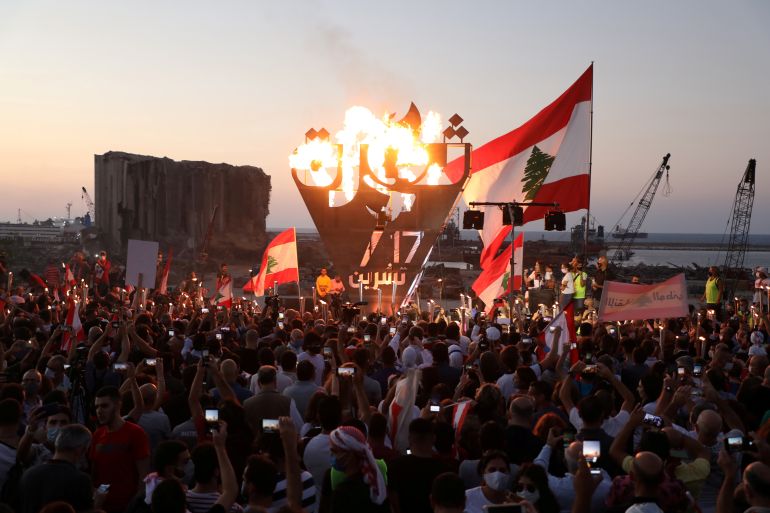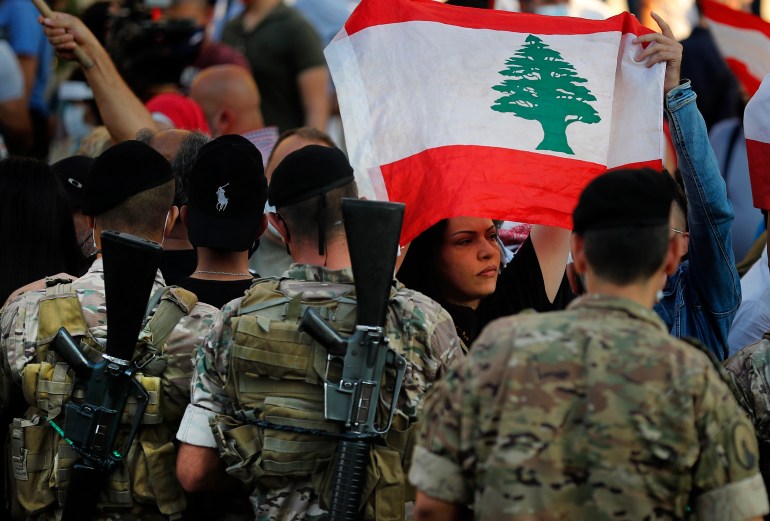For Lebanese and Iraqis, small victories in a long struggle
Demonstrators in both nations may have been beaten by the system but they are not ready to concede defeat.

Economic distress, rampant corruption, a self-serving ruling elite, and the ever-looming fear of armed militias – not much is going their way but protesters in both Iraq and Lebanon have found a reason to smile.
In campus elections in Lebanon, they turned into candidates and gave a drubbing to opposing student groups backed by traditional political parties that feed off sectarianism and propagate it. In Iraq, they are gearing up to challenge the established parties on the hustings and in the upcoming general election. Their message: they may have been beaten by the system but they are not ready to concede defeat.
Keep reading
list of 4 itemsLebanon riots: Security forces wound protesters with live fire
‘Wake up call’: Deadly Iraq rocket attack puts pressure on US
Condemnation after Iraqi-Kurd journalists given 6 years in jail
In October 2019, Iraq and Lebanon erupted in protests as people asked for jobs, an end to corruption, and the removal of the ruling political elite. The uprisings brought hope to a region left despondent by the failure of the Arab Spring in Egypt, Syria, Libya, and Yemen. Many thought that the Arab world might, after all, see a new dawn in its politics.
The prime ministers of Iraq and Lebanon were forced to resign, generating euphoria on the street at the idea that the protesters might be winning and succeeding in ushering in change. But soon enough the protests subsided and yielded nothing.
In Iraq, they were brutally crushed with 500 protesters killed and 15,000 injured, many by indiscriminate shooting allegedly by security forces and by gunmen widely believed to be from pro-Iran militias. Their Lebanese cousins were worn down by a string of crises; hyperinflation, a plummeting currency, and the biggest non-nuclear explosion the world had ever seen.
But just as analysts were writing off the Iraqi and Lebanese uprisings as another failed chapter in modern Arab history, the young people behind them moved from protests to politics. The journey ahead is going to be long, arduous, maybe even bloodier than the protests and yet they seem determined to keep fighting.
Elections in Iraq, initially slated to happen in June, have been pushed to October. So far a total of 260 political parties have registered to compete, of which 60 are new and either founded independently by protesters and activists or formed between demonstrators and existing political players.
Alaa Rikabi, an Iraqi activist from the southern city of Nasiriya, founded Imtidad or the Extension party. Tallal al-Hariri, a Baghdad-based activist, named his party “October 25” after the day Iraq witnessed one of the largest anti-government protests. Hussein al-Gharabi, a father of six, lawyer by profession, and protester by necessity, also from Nasiriya, co-founded Beit Watani or the National Home party.
All these outfits have shared goals – to replace the sect-based power-sharing system that institutionalises clientelism and a culture of bribery with a government of technocrats elected on the basis of their expertise, as well as to free their land from all sorts of foreign intervention.
“I can say my party is fully Iraqi, its funding is Iraqi, and its decisions are taken by Iraqis,” al-Gharabi told Al Jazeera. “Not like the rest of the parties which take orders from foreign countries. I consider the old political parties to be political shops. They have ‘buy loyalty’ programmes but not a political programme or a political vision for the future of Iraq.”
Political awakening
Lebanon is scheduled to vote in 2022. If one goes by results in campus elections held late last year, independent candidates stand a chance like never before to enter parliament and start making policy.
Consider this: independents won 85 out of a total of 101 seats at St Joseph University. At the most renowned university in Lebanon, the American University of Beirut (AUB), they scored 80 out of 101, quadrupling the gains they made in the last election in 2018.
At the Lebanese American University (LAU) they won all of the seats they contested, and at the Rafik Hariri University (RHU) they made inroads for the first time by winning four out of a total of nine seats.

Aya Abou Saleh is the president of the student council at the law faculty of the Saint Joseph University of Beirut. She said behind the landslide victories was a political awakening among the youth initiated by the “October revolution” in the country.
“Many of the students who were leaving the country stopped after the revolution,” Abou Saleh said. “They basically wanted to send a message to the ruling class that enough is enough, that the youth does not speak their language and we are not pawns any more in the little game they have been playing for decades on end. We don’t want sect or region-based politics but something else, something more modern, something worthy of the 21st century.”
She added the winners would first focus on negotiating the tuition fee, which has increased substantially since the Lebanese pound, pegged to the dollar, lost 80 percent of its value. But the bigger battle is to get ready to lead the country towards a new era of progress through parliamentary politics.
Death threats
Al-Gharabi in Iraq also said he is an ardent advocate of reform. Iraqis and Lebanese protesters, however, are joined not just by their vision but also their challenges. At the top of that list are constant threats from militias and the fear of being assassinated.
“I receive threats on my mobile phone and on social media almost daily,” said al-Gharabi. “I even received a threat live on the air when I was doing a television interview.”
Al-Gharabi said while he has not faltered as an activist, the threats had an effect on his decision to compete electorally. He is still pondering whether to fight the elections or support secular candidates from the outside.
“The security situation does not allow free and fair elections,” he said. “There is a fear of uncontrolled weapons and militias, as well as the control of traditional parties over the state.”
Dhia al-Assadi, an academic and former chair of Al-Ahrar Bloc in the parliament, curiously agreed with al-Gharabi on one thing: traditional parties control resources and it would be hard for independent candidates to break through.
“Moreover, protesters who have formed political parties have lost credibility among their peers because they have changed course and are trying to change the system from within,” said al-Assadi. “While other segments of protesters are against the whole system and don’t think it can be changed by simply fighting elections.”
Makram Rabah, a lecturer at the AUB, said as in Iraq in Lebanon too there was a fear of an Iran-backed militia, Hezbollah. “At the end of the day Iranian militias are controlling the ground in Lebanon and in Iraq and are killing us, which won’t change if we win or lose elections,” Rabah said.
Nassir Yassin, also a professor at the AUB, said while the results of campus elections were a “blow” to the traditional political parties, they could still bank on identity politics to work in national elections.
“General elections carry a specific meaning to a lot of constituents, whether around geographic identity or sectarian belonging or actually loyalty to political leaders who gave them jobs under their clientelistic networks,” said Yassin.
Sami Nader, an expert on regional politics, was more optimistic. He said despite the inadequacies of the Lebanese electoral law and its sectarian distribution of seats there was still a purpose to participation in elections.
“Student elections are transparent, where no money changes hands. General elections are tweaked via gerrymandering and a law that is tailor-made to benefit sectarian parties,” he said. “We don’t have time to change the electoral law before 2022. But we should still go ahead because we will see a change. Even limited change is worth it.”
Iraqis managed to force their government to pass a new electoral law in November last year that divided each of Iraq’s 18 provinces into 83 different electoral districts. It offers the independents a greater chance at winning but in Iraq, too, the tools and resources to win remain in the hands of the political elite.
The protesters in both countries acknowledge they may not form governments in their respective capitals but claim they will make a dent in the tally of the existing parties.
If not by revolution then by sheer persistence they intend to change their politics however long it might take. For now, small victories in a long struggle have lent the air a much-needed whiff of optimism.